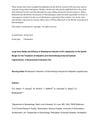 815 citations,
April 2010 in “The Journal of Clinical Endocrinology & Metabolism”
815 citations,
April 2010 in “The Journal of Clinical Endocrinology & Metabolism” Women with PCOS should be screened for heart disease risk and manage their health to prevent it.
 150 citations,
February 2013 in “Surgical Infections”
150 citations,
February 2013 in “Surgical Infections” Silver can help prevent and treat infections but its effectiveness varies and should be weighed against costs and side effects.
[object Object]  81 citations,
July 2012 in “Translational Psychiatry”
81 citations,
July 2012 in “Translational Psychiatry” Memantine may slightly improve memory in people with Down syndrome, but more research is needed.
 47 citations,
June 2015 in “Medicines”
47 citations,
June 2015 in “Medicines” Panax ginseng is generally safe with mild side effects and may have health benefits, but more research is needed.
 39 citations,
January 1994 in “European Journal of Cancer”
39 citations,
January 1994 in “European Journal of Cancer” Scalp cooling is largely ineffective in preventing hair loss from breast cancer chemotherapy.
 1 citations,
April 2018 in “The journal of investigative dermatology/Journal of investigative dermatology”
1 citations,
April 2018 in “The journal of investigative dermatology/Journal of investigative dermatology” Topical patidegib gel effectively treats basal cell carcinoma in Gorlin syndrome patients without causing the side effects seen with oral treatments.
 1 citations,
May 2018 in “The journal of investigative dermatology/Journal of investigative dermatology”
1 citations,
May 2018 in “The journal of investigative dermatology/Journal of investigative dermatology” The symposium highlighted the importance of understanding disease mechanisms for targeted dermatology treatments.
 131 citations,
October 2004 in “Clinical Cancer Research”
131 citations,
October 2004 in “Clinical Cancer Research” Tempol is safe and may prevent hair loss from brain radiotherapy.
 95 citations,
April 2013 in “PLOS ONE”
95 citations,
April 2013 in “PLOS ONE” Ginseng is possibly safe but its effectiveness is unclear due to poor quality studies and mixed results.
[object Object]  87 citations,
July 2012 in “Expert Review of Clinical Immunology”
87 citations,
July 2012 in “Expert Review of Clinical Immunology” Pregnancy can increase lupus activity, but careful planning and treatment can improve outcomes.
 62 citations,
February 2011 in “Expert review of dermatology”
62 citations,
February 2011 in “Expert review of dermatology” Scalp cooling can reduce chemotherapy-induced hair loss and should be available in all hospitals.
 37 citations,
May 2004 in “Multiple Sclerosis Journal”
37 citations,
May 2004 in “Multiple Sclerosis Journal” The article concludes that proper injection techniques and patient education can prevent serious skin reactions from multiple sclerosis medications.
 2 citations,
November 2019 in “Skin appendage disorders”
2 citations,
November 2019 in “Skin appendage disorders” Platelet-rich plasma doesn't prevent hair loss from chemotherapy, and mononuclear cells only help against hair loss from one specific chemotherapy drug.
 1 citations,
May 2006 in “Expert Opinion on Therapeutic Patents”
1 citations,
May 2006 in “Expert Opinion on Therapeutic Patents” No FDA-approved treatments for chemotherapy-induced hair loss existed in 2006; more research was needed.
 January 2018 in “International journal of food and nutrition research”
January 2018 in “International journal of food and nutrition research” Intermittent iron and nutritional supplements can help reduce hair loss.
 28 citations,
September 2014 in “Journal of Clinical Oncology”
28 citations,
September 2014 in “Journal of Clinical Oncology” Men with baldness at the front and top of their head at age 45 may have a higher risk of aggressive prostate cancer.
 9 citations,
June 2019 in “Archives of Dermatological Research”
9 citations,
June 2019 in “Archives of Dermatological Research” Both topical calcipotriol and narrowband UVB improved alopecia, but combining them didn't enhance the effect on hair loss severity, despite higher vitamin D3 levels.
 5 citations,
January 2013 in “Journal der Deutschen Dermatologischen Gesellschaft”
5 citations,
January 2013 in “Journal der Deutschen Dermatologischen Gesellschaft” The document concludes that individualized treatment for malignant epithelial tumors is necessary and more research on metastatic squamous cell carcinoma treatments is needed.
 2 citations,
October 2020 in “Dermatologic Therapy”
2 citations,
October 2020 in “Dermatologic Therapy” Herbal solution improves hair diameter and density more than 5% minoxidil for androgenetic alopecia.
 47 citations,
December 2006 in “Therapy”
47 citations,
December 2006 in “Therapy” The dietary supplement helped increase hair growth in women with hair loss.
 38 citations,
October 2014 in “British journal of dermatology/British journal of dermatology, Supplement”
38 citations,
October 2014 in “British journal of dermatology/British journal of dermatology, Supplement” Bimatoprost solution is effective and safe for long-term use in treating eyelash thinning.
 20 citations,
January 2013 in “Evidence-based complementary and alternative medicine”
20 citations,
January 2013 in “Evidence-based complementary and alternative medicine” TGPC plus CGT is effective and safe for treating severe alopecia areata in children.
 7 citations,
August 2020 in “Health and Quality of Life Outcomes”
7 citations,
August 2020 in “Health and Quality of Life Outcomes” Birth control pills containing cyproterone acetate improve the quality of life more for women with polycystic ovary syndrome after 6 months of use.
 45 citations,
February 2019 in “Journal of Affective Disorders”
45 citations,
February 2019 in “Journal of Affective Disorders” Melatonin improved mental health and metabolism in women with PCOS.
 36 citations,
January 2014 in “Evidence-based Complementary and Alternative Medicine”
36 citations,
January 2014 in “Evidence-based Complementary and Alternative Medicine” Pumpkin seed oil helps hair growth in men with hair loss.
 31 citations,
June 2018 in “Dermatologic Surgery”
31 citations,
June 2018 in “Dermatologic Surgery” Low-level light therapy safely improves hair coverage, thickness, and count in androgenetic alopecia patients.
 January 2020 in “bioRxiv (Cold Spring Harbor Laboratory)”
January 2020 in “bioRxiv (Cold Spring Harbor Laboratory)” Semecarpus anacardium leaf extracts may offer safe, effective cancer treatment alternatives.
 December 2023 in “Trials”
December 2023 in “Trials” The trial is testing if a helmet that uses light can prevent hair loss during chemotherapy.
27 citations,
March 2008 in “Cell stress & chaperones” Localized heat or specific injections can prevent chemotherapy-induced hair loss without affecting cancer treatment.
86 citations,
November 2020 in “Annals of Oncology” Early intervention and tailored management can reduce skin side effects from cancer treatments.



























